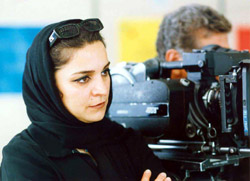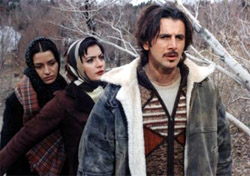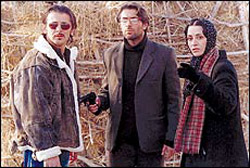Dec 21, 2025
Dec 21, 2025
 It takes a lot of guts to make political films in Iran. Ask Tahmineh Milani and she'll tell you how difficult and risky it is. And yet, she has been willing to pay a price for attempting to raise the level of political consciousness in her country through her films.
It takes a lot of guts to make political films in Iran. Ask Tahmineh Milani and she'll tell you how difficult and risky it is. And yet, she has been willing to pay a price for attempting to raise the level of political consciousness in her country through her films.
At 46, Milani is probably the most successful of Iran's women filmmakers today, and remains committed to making films that will generate debate of issues that concern "the health of my society". "My films are mainly about the economic, social and psychological problems facing Iranian women - middle-class women in particular," she says.
 Following the release of 'Nimeh-ye Penhan' (The Hidden Half) in 2001, Milani was arrested and jailed by Iran's Islamic judiciary. She was accused of "abusing arts as a tool for actions which will suit the taste of the counter-revolutionary and mohareb (enemies of God) groups". Following protests by Iranian and international filmmakers such as Francis Ford Coppola, Martin Scorsese, Steven Soderbergh and Mike Leigh, she was eventually freed after two weeks and the charges were dropped.
Following the release of 'Nimeh-ye Penhan' (The Hidden Half) in 2001, Milani was arrested and jailed by Iran's Islamic judiciary. She was accused of "abusing arts as a tool for actions which will suit the taste of the counter-revolutionary and mohareb (enemies of God) groups". Following protests by Iranian and international filmmakers such as Francis Ford Coppola, Martin Scorsese, Steven Soderbergh and Mike Leigh, she was eventually freed after two weeks and the charges were dropped.
 It was the Islamic revolution of 1979 that channeled her innate love for films into professional art. When the universities in Iran closed down for four years, Milani, then a student, turned to alternative modes of creative and intellectual fulfillment. But as 'Do Zan' (Two Women), 1999, showcases, there were several women of her generation who were not so free and had been forced into marriage by their families, or "exiled or killed" during the revolution. It was for their sake that she felt duty-bound to make The Hidden Half. "I can only make films about things I feel myself," Milani emphasizes.
It was the Islamic revolution of 1979 that channeled her innate love for films into professional art. When the universities in Iran closed down for four years, Milani, then a student, turned to alternative modes of creative and intellectual fulfillment. But as 'Do Zan' (Two Women), 1999, showcases, there were several women of her generation who were not so free and had been forced into marriage by their families, or "exiled or killed" during the revolution. It was for their sake that she felt duty-bound to make The Hidden Half. "I can only make films about things I feel myself," Milani emphasizes.
A graduate in architecture from Tehran University, she apprenticed in set design for a year and spent seven years as a first assistant director before making her first film in 1989, 'Farzandan-e Tallagh' (Children of Divorce). Married to an architect, Mohammad Nikbin, who is also an actor and the producer of her films, her own abiding interest in architecture is reflected in the way she structures her issue-based stories. This is evident in the nine feature films she has made since, including 'Afsane-ye-Ah' (The Legend of a Sigh, 1991), 'Digeh che Khabar?' (What Else Is New? 1992).
Milani's earlier film, 'Kakadu' (1996), was banned and still cannot be seen in Iran because it shows an eight-year old girl without a scarf. The Unwanted Woman (2005) deals with the question of why a married woman is punished if she has a lover while her husband is legally free to have mistresses. 'Vakones-eh Panjom' (The Fifth Reaction, 2003) interrogates the "very political subject" of the relationship between a widow and her father-in-law who not only wants to control his dead son's property and his grandson, as is permitted by Iranian laws, but also demands that her daughter-in-law either marry his other son, or give up custody of her child. All her films raise such questions.
Working within a repressive regime, Iranian directors have successfully used indirect ways to deal with controversial issues. Milani mentions Abbas Kiarostami's films about children. such as 'Where is the Friend's Home', as one in such a trend-setting genre.
Interestingly, her own latest film, 'Cease Fire', which she wrote with Dr. Lucia Capacchione, the American art therapist and author of 'Recovery of Your Inner Child', employs the comic mode. Using a textbook case, the film dramatizes the conflict between a traditional male and his liberated wife to bring home the message that the changing reality of relationships demands an equal adjustment from men as from women.
Although some of her earlier films have been box office hits in Iran, none has received the overwhelming acclaim of 'Cease Fire', which turned out to be the largest grossing film in Iranian history. This may be a hopeful sign that Iranian audiences are finally ready to accept and respond to films that question the orthodox definition of a woman's place in society.
While talking of India's mainstream Hindi films, Milani praises Deepa Mehta's 'Water' as a critique of the traditional Indian attitude towards widows. However, she is skeptical of the loud manner in which some Bollywood films broadcast messages interwoven with song-and-dance sequences.
But how far have her own films changed conditions in Iran? "The best way to change things is by challenging established norms and provoking discussion," says Milani. When former Iranian president Mohamed Khatami called for "dialogue among civilizations", she wrote to him suggesting that what was necessary first was "a dialogue within the society - between husband and wife, sister and brother, between neighbors."
"My concern is not for countries but for people," she says, because she believes that as an artist, "You have to be apolitical and keep a wide perspective."
24-Dec-2006
More by : Devindra Kohli